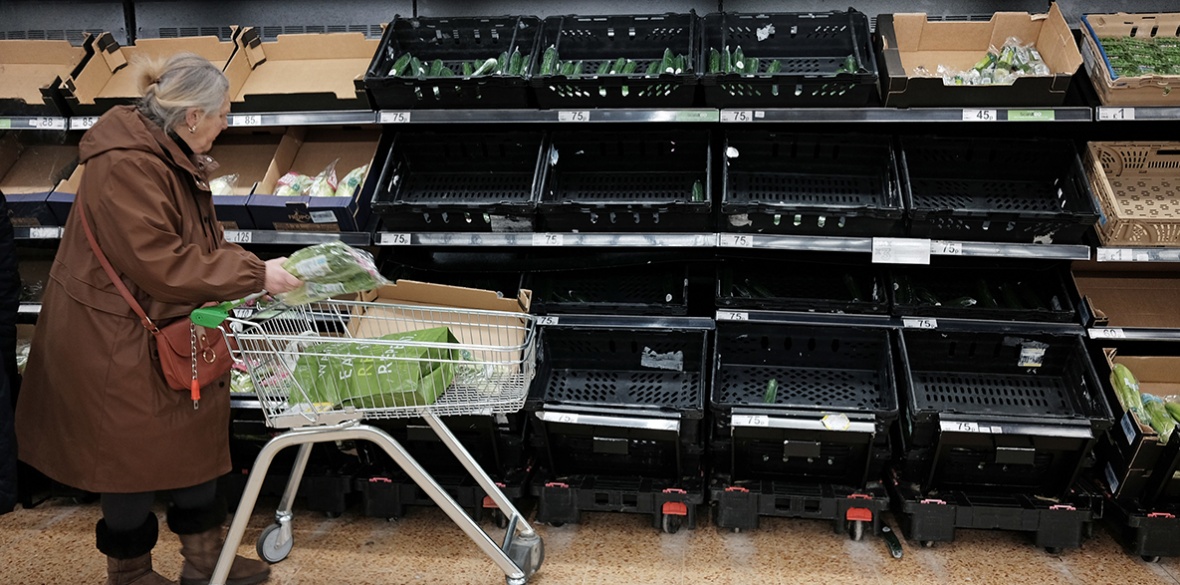This is the last article you can read this month
You can read more article this month
You can read more articles this month
Sorry your limit is up for this month
Reset on:
Please help support the Morning Star by subscribing here
A THIRD of shopworkers are so stressed by violence, threats and abuse that they think about quitting.
Abuse is down on its height during the pandemic — where shopworkers were often on the front line of enforcing public health measures such as mask-wearing — but remains higher than beforehand.
Retail union Usdaw has been drawing attention to this worsening picture for years. There are powerful social and economic drivers behind anti-social behaviour and rising crime, from rising poverty to atomised workplaces and communities.
Pointing to these is to risk dismissal as a “bleeding-heart liberal” by both Tory and Labour politicians, whose instinct is to call for more police officers and greater police powers, however many horror stories we hear about these being abused.
But placing social trends in context is not about taking crime less seriously.
Usdaw calls for joint work between police, courts and retail employers to ensure those who abuse shopworkers are held accountable, and for stiffer penalties on conviction. At the same time it notes the “astronomical” sums retailers are now paying for security and yet losing through theft.
We are now becoming familiar with the consequences of widespread hunger. Foods from meat joints to cereal bars appear encased in security boxes; fridges containing bacon or sausages may be locked against theft.
When people are driven to steal food confrontations with shopworkers are bound to rise, and people will be hurt. The anger and frustration people feel when encountering empty shelves through supply chain disruption can also be taken out, quite unjustifiably, on shopworkers.
If we are not simply to get used to an increasingly dystopian society, in which basic foodstuffs are kept under lock and key, those charged with their distribution go to work fearing attack and the food security of the whole country comes into question, we need to face the reality of an accelerating global crisis.
Rising hunger is linked to rising poverty — and this is down to our government’s policy of using inflation and wage “restraint” to force pay down in real terms. But that policy itself is part of an ideological commitment to letting the market determine the price of everything (except labour, which the state is happy to intervene to control).
And that reliance on the market is also at the root of our food security problems.
An increasingly vocal liberal constituency blames Brexit for these, at its most vulgar posting social media photos of boxes full of tomatoes from Italy or Germany to taunt British shoppers — though similar photos could be taken at many smaller British shops.
Supermarkets which have been squeezing suppliers for years to force down prices are finding that smaller, more flexible outlets can outcompete them in a seller’s market.
But blaming Brexit is dangerous because it is an excuse not to address the bigger picture. These shortages are real.
The crisis in egg supply late last year was connected to outbreaks of avian flu, which also made headlines for driving the price of Christmas turkeys and geese sky-high a few months ago. Industrialised agribusiness and intensive farming are predicted to make diseases like this — which can force farmers to slaughter entire flocks — more common.
Record droughts and heatwaves across southern Europe have hit Mediterranean produce, one cause of the tomato shortages; another is the way soaring energy prices have made it uneconomical to grow these products at scale in greenhouses in northern countries like our own.
None of these issues are going away. Global warming is with us. “Decoupling” and great power rivalry are hitting energy supplies.
There are answers. We need to invest in locally produced, renewable and green energy. We need to shift to more localised agricultural production. Tory gaffes aside, we may even need to eat more turnips.
The problem is the market doesn’t have these answers — and neither do our politicians.












